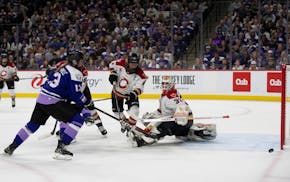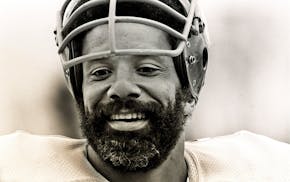Football camps from high school to NFL will commence in the next few weeks. Time for players to train together, spend countless hours together and suffer through aches and pains together. A time for a team to build camaraderie.
It's not a time for macho nonsense.
The unfolding crisis at Northwestern serves as a reminder to all that hazing in sports should never be misconstrued as an important team-building exercise.
Hazing is idiotic. It's juvenile and harmful and, in worst cases, it's criminal.
Northwestern's football program is in flames over a hazing scandal that cost coach Pat Fitzgerald his job and undoubtedly will cost the university millions of dollars to settle lawsuits filed by former players. The damage caused by an apparent time-honored, ritualistic culture of hazing inside the football program will be far-reaching.
The details are vile. In multiple lawsuits, former players allege sexual and psychological abuse.
And for what? To put freshmen in their place? To create some weird, perverse, all-for-one mindset that supposedly helps them dig deep in the fourth quarter against Purdue in November?
“Who wants to be demeaned like that? There's just no place for it on a team.”
I've never understood the rationale behind hazing. Hey, let's humiliate the young guys because they have to pay their dues!
Maybe the most surprising aspect of the Northwestern hazing revelations is that this nonsense still happens in 2023. On what planet does anyone think it's even remotely acceptable to degrade teammates by subjecting them to punishment that is sexual in nature?
Sadly, these cases continue to come to light, though thankfully far less frequently as attitudes have evolved over what is acceptable locker room behavior.
Sportswriters and fans often roll our eyes when coaches or executives praise the culture that exists inside their team. For this discussion, the concept of culture matters. Hazing is either tolerated, or it's not. Fitzgerald's defense that he was unaware of hazing is not a defense at all. His program, his responsibility.
Hazing is not limited to football, of course. Incidents happen in every sport, both genders. The Northwestern case demonstrates how ingrained hazing can become in any program if allowed to take root, a strange rite of passage for those who stay with the program.
I texted 25 former football players that I have covered at various points — college and NFL — to ask if they ever experienced hazing at any level in their careers. I offered anonymity in exchange for honesty.
Most responded. About half answered yes, but nothing at the level of what is being alleged at Northwestern.
The kind of hazing they encountered was more mild stuff that happens at many places: carrying shoulder pads of older players to the locker room after practice, getting hair buzzed off, buying food for the position group.
"It happens to establish a pecking order," one player texted.
Another player wrote that locker room hazing often stems from players wanting to establish "a social hierarchy on a team."
Problems arise when that desire for hierarchy comes at the expense of human decency.
"I think it's beyond dumb," one player texted simply.
Said another: "I told myself that when I was an older guy I was gonna do the opposite."
Former Gophers coach Glen Mason had a zero-tolerance policy on hazing, which he addressed at the start of every fall camp. Mason told me his perspective was shaped by his college coach, Ohio State's Woody Hayes, who did not permit hazing in any form.
"You were a vital member of the team and everybody would be treated with respect," Mason said, recalling Hayes' message to players.
Mason had a near-hazing incident happen in his first season as Gophers coach in 1997. Veterans concocted a hazing scheme for fall camp. An assistant coach found out and stopped it before alerting Mason, who called a team meeting.
"I was livid," Mason said. "The language I used … I challenged them."
Mason said he stood nose-to-nose with one of the veterans who organized it.
"I said, 'I'm going to tell you something: Either you are going to abide by the rules of this team — my rules — or you're gone. You better make up your mind right now.' " Mason recalled.
A player who was on the team and at the meeting said Mason "ripped into guys like nothing I had ever seen."
Mason said the whole notion of hazing made him that angry.
"Who wants to be demeaned like that?" he said. "There's just no place for it on a team."

Twins lose second in a row to Blue Jays as bullpen falters late

The PWHL's growth comes with a price for a Minnesota Frost team building a potential dynasty
What is the 'House settlement,' and what does it mean for the Gophers and NCAA?

Souhan: Anxiety and depression in the NFL helped inspire Lindsey Young's children's book
